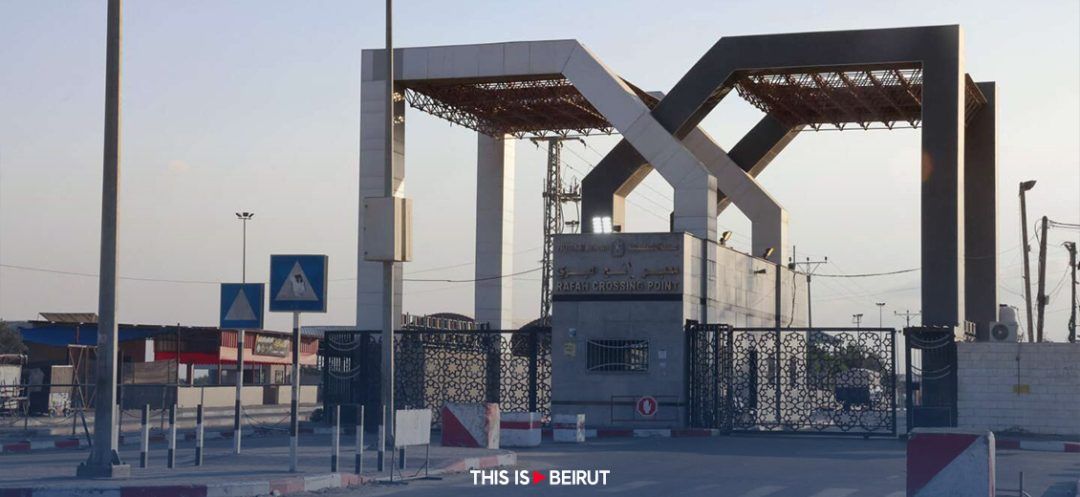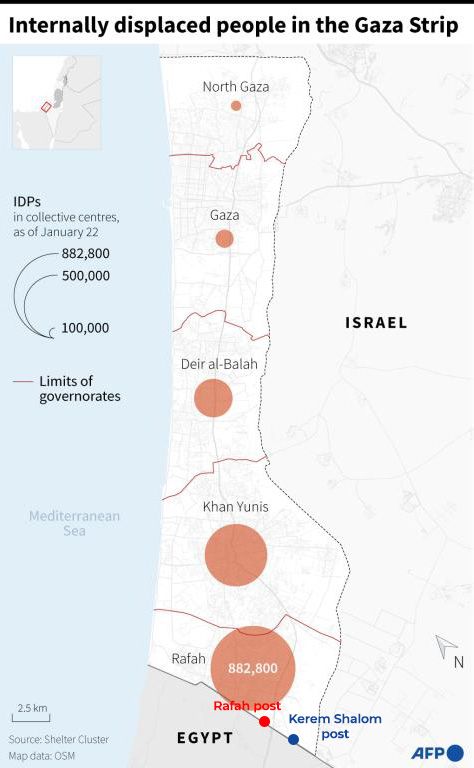- Home
- War in the Middle East
- Rafah's Fate Teeters on the Edge

Between Monday's UN resolution urging an immediate ceasefire in Gaza and Israel's preparations for an assault on Rafah, the fate of this densely populated city in the enclave's south now teeters on the edge.
The UN Security Council approved on Monday the first resolution calling for an “immediate ceasefire” in the Gaza Strip, five and a half months after the outbreak of the war between Israel and Hamas in the Palestinian enclave on October 7.
This vote contradicts the plans of Israeli Prime Minister Benjamin Netanyahu, who has boldly declared since February 7, 2024 that victory over Hamas is “within reach.” However, he asserts that to achieve this victory, an assault on Rafah in the south of Gaza is necessary, as it is considered “the last bastion of Hamas” that he has sworn to “eliminate.” Such a victory will not come without risks for Netanyahu, particularly following Hamas' unprecedented attack on Israel on October 7, as he seeks to secure his political survival.
Before October 7, Rafah, located on the border with Egypt, had a population of just 280,000 inhabitants. Despite its modest 60 km² area, it now accommodates nearly 1.4 million people, out of Gaza's total population of 2.3 million persons. Responding to Tel Aviv's ultimatums, which urged the population of northern Gaza to move south before a significant military operation against Hamas in that area of the enclave, Gazans massively fled towards the south.
This influx increased Rafah's population six-fold, according to the United Nations Relief and Works Agency for Palestine Refugees (UNRWA). The density is reported to be twenty people per square meter, as per the Palestinian News Agency.
Should Netanyahu proceed with his offensive plans, the sole remaining option for the thousands of Gazans crowded into Rafah would be to attempt a forced crossing of the Egyptian borders, recognizing Egypt’s unpreparedness to accommodate them.
Despite a heightened international pressure to abandon his plans, the Israeli Prime Minister remains resolute. Responding to remarks by US Secretary of State Antony Blinken on March 22, cautioning that an operation in Rafah could “further isolate Israel,” Netanyahu answered, “Israel will carry out an offensive in Rafah, even without the support of the US.”
A Security Stake for Cairo
In this case, what would be the fate of the peace agreement with Israel, in effect since 1979, if Benjamin Netanyahu were to carry out his threat? How would the international community react, with warnings increasingly being issued at present? And, most importantly, what would happen to the Gazans? Many questions arise, though for now, some remain unanswered or are speculative.
All signs currently point to Cairo's unwavering commitment to its peace agreement with Tel Aviv, with a clear determination to uphold the status quo along the border with Gaza. On February 22, Egyptian Minister of Foreign Affairs Sameh Shoukry reiterated the significance of the “40-year-old peace agreement signed with Israel,” adding, “we will strive to uphold its continuity.”
As is well known, Egypt made history on March 26, 1979, by signing a peace treaty with Israel in Washington, thus becoming the first Arab country to recognize Israel as a state.
Thanks to this agreement, the Sinai Peninsula was returned to Cairo. Furthermore, a buffer zone was established along the border between Egypt and the Gaza Strip, under joint Israeli-Egyptian control. This zone, known as the Philadelphi Corridor, extends 14 kilometers in length and 100 meters in width from the Mediterranean to the Karem Abu Salem crossing (or Kerem Shalom). The corridor includes the Rafah crossing into Egypt, the only land passage from the Strip not controlled by Israel.
However, an Israeli military operation in Rafah could violate this peace agreement, as it would inevitably alter the status quo in force since 1979. However, we know that Egypt will oppose any modification to the Philadelphi Corridor's status, as such modification would directly threaten its security.
 Number of internally displaced people (IDPs) by governorate, according to Shelter Cluster data as of January 22 AFP Simon Malfatto Maxence D'Aversa Sabrina Blanchard Sylvie Husson
Number of internally displaced people (IDPs) by governorate, according to Shelter Cluster data as of January 22 AFP Simon Malfatto Maxence D'Aversa Sabrina Blanchard Sylvie Husson
On the international level, Benjamin Netanyahu lost the backing of the US in his war with Hamas due to its impact on civilians. The international community is intensifying its warnings against an attack on Rafah, chiefly due to the potential significant loss of life, while simultaneously hoping for the success of diplomatic efforts to secure a ceasefire.
On February 10, the European Union’s Foreign Affairs Chief, Josep Borrell, addressed the issue on the platform X, echoing “the warning issued by several EU member states that an Israeli offensive on Rafah would result in an indescribable humanitarian disaster and significant tensions with Egypt.”
On the other hand, Antony Blinken reiterated on Tuesday “his opposition to a large-scale ground operation in Rafah,” according to Matthew Miller, spokesperson for the State Department. While reaffirming “the US support for ensuring Hamas' defeat, including in Rafah,” Blinken highlighted “the existence of alternative solutions beyond a massive ground invasion, which would better ensure Israel's security and the protection of Palestinian civilians.”
The US estimate that the Israeli government has not provided a coherent plan for evacuating the 1.4 million people in Rafah, as announced by the Israeli Prime Minister in February.
A War Crime
Human Rights Watch (HRW) issued a warning on February 9 against any proposed evacuation plan for Rafah, labeling it as “catastrophic and illegal.”
Under international humanitarian law, the forced displacement of civilians is prohibited, except when temporarily necessary for their security or for imperative military reasons. Civilians who choose not to evacuate an area after being warned should be provided with integral protection, which will be impossible in Rafah.
Within this framework, the UN's human rights chief, Volker Türk, accused on February 8 the Israeli military of violating international humanitarian law by highlighting the consequences of demolishing buildings and agricultural lands in Gaza, located less than a kilometer from the barrier between Israel and Gaza, with the aim of creating a “buffer zone.”
These actions exacerbate “the displacement of communities that inhabited these areas before the escalation of hostilities, and appear to aim at or make the return of civilians to these zones impossible,” Volker Türk decried, reminding authorities that “the forced transfer of civilians may constitute a war crime.”
French President Emmanuel Macron echoed the same sentiment by repeatedly expressing his “firm opposition” to an Israeli military offensive in Rafah, warning that “forced population transfer constitutes a war crime.”
“Looking at Gaza, it is as if the four horsemen of the Apocalypse are riding overhead, spreading war, famine, conquest and death,” lamented UN Secretary-General Antonio Guterres during his visit to Egypt on Sunday.
Given this outcry, will Benjamin Netanyahu continue to turn a blind eye?
The UN Security Council approved on Monday the first resolution calling for an “immediate ceasefire” in the Gaza Strip, five and a half months after the outbreak of the war between Israel and Hamas in the Palestinian enclave on October 7.
This vote contradicts the plans of Israeli Prime Minister Benjamin Netanyahu, who has boldly declared since February 7, 2024 that victory over Hamas is “within reach.” However, he asserts that to achieve this victory, an assault on Rafah in the south of Gaza is necessary, as it is considered “the last bastion of Hamas” that he has sworn to “eliminate.” Such a victory will not come without risks for Netanyahu, particularly following Hamas' unprecedented attack on Israel on October 7, as he seeks to secure his political survival.
Before October 7, Rafah, located on the border with Egypt, had a population of just 280,000 inhabitants. Despite its modest 60 km² area, it now accommodates nearly 1.4 million people, out of Gaza's total population of 2.3 million persons. Responding to Tel Aviv's ultimatums, which urged the population of northern Gaza to move south before a significant military operation against Hamas in that area of the enclave, Gazans massively fled towards the south.
This influx increased Rafah's population six-fold, according to the United Nations Relief and Works Agency for Palestine Refugees (UNRWA). The density is reported to be twenty people per square meter, as per the Palestinian News Agency.
Should Netanyahu proceed with his offensive plans, the sole remaining option for the thousands of Gazans crowded into Rafah would be to attempt a forced crossing of the Egyptian borders, recognizing Egypt’s unpreparedness to accommodate them.
Despite a heightened international pressure to abandon his plans, the Israeli Prime Minister remains resolute. Responding to remarks by US Secretary of State Antony Blinken on March 22, cautioning that an operation in Rafah could “further isolate Israel,” Netanyahu answered, “Israel will carry out an offensive in Rafah, even without the support of the US.”
A Security Stake for Cairo
In this case, what would be the fate of the peace agreement with Israel, in effect since 1979, if Benjamin Netanyahu were to carry out his threat? How would the international community react, with warnings increasingly being issued at present? And, most importantly, what would happen to the Gazans? Many questions arise, though for now, some remain unanswered or are speculative.
All signs currently point to Cairo's unwavering commitment to its peace agreement with Tel Aviv, with a clear determination to uphold the status quo along the border with Gaza. On February 22, Egyptian Minister of Foreign Affairs Sameh Shoukry reiterated the significance of the “40-year-old peace agreement signed with Israel,” adding, “we will strive to uphold its continuity.”
As is well known, Egypt made history on March 26, 1979, by signing a peace treaty with Israel in Washington, thus becoming the first Arab country to recognize Israel as a state.
Thanks to this agreement, the Sinai Peninsula was returned to Cairo. Furthermore, a buffer zone was established along the border between Egypt and the Gaza Strip, under joint Israeli-Egyptian control. This zone, known as the Philadelphi Corridor, extends 14 kilometers in length and 100 meters in width from the Mediterranean to the Karem Abu Salem crossing (or Kerem Shalom). The corridor includes the Rafah crossing into Egypt, the only land passage from the Strip not controlled by Israel.
However, an Israeli military operation in Rafah could violate this peace agreement, as it would inevitably alter the status quo in force since 1979. However, we know that Egypt will oppose any modification to the Philadelphi Corridor's status, as such modification would directly threaten its security.
 Number of internally displaced people (IDPs) by governorate, according to Shelter Cluster data as of January 22 AFP Simon Malfatto Maxence D'Aversa Sabrina Blanchard Sylvie Husson
Number of internally displaced people (IDPs) by governorate, according to Shelter Cluster data as of January 22 AFP Simon Malfatto Maxence D'Aversa Sabrina Blanchard Sylvie HussonOn the international level, Benjamin Netanyahu lost the backing of the US in his war with Hamas due to its impact on civilians. The international community is intensifying its warnings against an attack on Rafah, chiefly due to the potential significant loss of life, while simultaneously hoping for the success of diplomatic efforts to secure a ceasefire.
On February 10, the European Union’s Foreign Affairs Chief, Josep Borrell, addressed the issue on the platform X, echoing “the warning issued by several EU member states that an Israeli offensive on Rafah would result in an indescribable humanitarian disaster and significant tensions with Egypt.”
On the other hand, Antony Blinken reiterated on Tuesday “his opposition to a large-scale ground operation in Rafah,” according to Matthew Miller, spokesperson for the State Department. While reaffirming “the US support for ensuring Hamas' defeat, including in Rafah,” Blinken highlighted “the existence of alternative solutions beyond a massive ground invasion, which would better ensure Israel's security and the protection of Palestinian civilians.”
The US estimate that the Israeli government has not provided a coherent plan for evacuating the 1.4 million people in Rafah, as announced by the Israeli Prime Minister in February.
A War Crime
Human Rights Watch (HRW) issued a warning on February 9 against any proposed evacuation plan for Rafah, labeling it as “catastrophic and illegal.”
Under international humanitarian law, the forced displacement of civilians is prohibited, except when temporarily necessary for their security or for imperative military reasons. Civilians who choose not to evacuate an area after being warned should be provided with integral protection, which will be impossible in Rafah.
Within this framework, the UN's human rights chief, Volker Türk, accused on February 8 the Israeli military of violating international humanitarian law by highlighting the consequences of demolishing buildings and agricultural lands in Gaza, located less than a kilometer from the barrier between Israel and Gaza, with the aim of creating a “buffer zone.”
These actions exacerbate “the displacement of communities that inhabited these areas before the escalation of hostilities, and appear to aim at or make the return of civilians to these zones impossible,” Volker Türk decried, reminding authorities that “the forced transfer of civilians may constitute a war crime.”
French President Emmanuel Macron echoed the same sentiment by repeatedly expressing his “firm opposition” to an Israeli military offensive in Rafah, warning that “forced population transfer constitutes a war crime.”
“Looking at Gaza, it is as if the four horsemen of the Apocalypse are riding overhead, spreading war, famine, conquest and death,” lamented UN Secretary-General Antonio Guterres during his visit to Egypt on Sunday.
Given this outcry, will Benjamin Netanyahu continue to turn a blind eye?
Read more



Comments